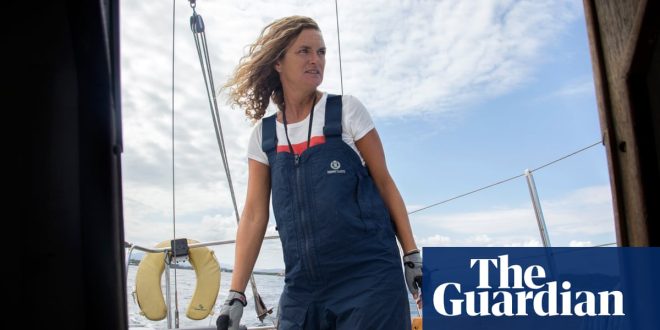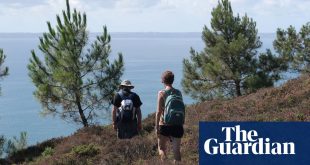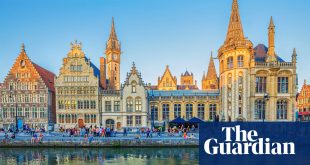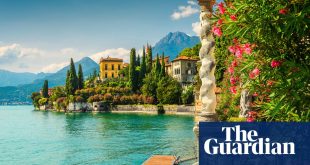I’m staring at a seahorse. At the little spines on its head. A spiky crown. Like a unicorn under water. Such sightings are always precious, but this one feels unique because I’ve convinced myself that he’s giving birth. I watch them daily, these bony little fish, tails curling twigs, fanning delicately, performing their sunrise greetings (my heart!). This little fella angles this way and that while bubbles, or perhaps thousands of tiny seahorse babies ejected from his pouch, rise around him. It’s hard to tell, but who needs proof? The possibility is magical enough. Life is fairytale-special. If you choose to see it that way.
We’re in northern Greece, the seahorses and me, a few miles south-east of Preveza, in the Ionian sea. But you could find them in your own watery back yard, too – even in London. Hippocampus hippocampus breed in the outer Thames, and along England’s south coast.
I sailed to Greece, kind of by accident, a few years back. I had left my job in London, and set off on a small boat with a loose plan to navigate Britain. But at Land’s End, I got caught up in my own adventure and sailed across the channel to France. A couple of years later, I landed in Greece. No regrets, obviously. It was the thrill of exploration that took me, the cultural draw of foreign lands. But when I think about the thousands of miles I sailed, the most life-changing, heart-expanding experiences were in Britain. It often takes leaving home to really see it. How wonderful, I recall, British shores are. The Atlantic, the North and Irish seas. The smell of seaweed, colonies of seals. The rhythm of tides. How I miss tides!
I will for ever remember my awakening, a newfound freedom, meandering England’s bucolic south-west coast at a sea snail’s pace. The drifting landscapes, Dorset’s chalk hills and pretty harbours, the drama of Durdle Door. But it was the shifting seas that really held me as I edged west. The clarity of the water increasing, colours changing, from sediment-tinged greens and browns in the east to deep blues in the West Country.
By the time I crossed Lyme Bay, the 40-mile gateway between Dorset and Devon, I was open-mouthed to find turquoise waters lapping Salcombe’s white beaches. Shockingly beautiful. Surely not Britain, I remember thinking. But perception is a strange thing. We associate such scenes with far-flung places while we have many, too, in the UK. I felt a stirring of childhood memories, of running into cold clear water from the silky whites of Mull’s Calgary beach in the Western Isles.
Back down south, the Jurassic coast draws visitors by day for its beaches casually strewn with beautiful ammonite fossils. But by night, too, it’s a place of wonder, often alive with light. Where the River Lym runs into the sea, you can find little clam-like shellfish – common piddock – glowing in the dark. Bioluminescent bivalves. The Romans loved them, judging by Pliny’s accounts of hedonistic parties. At late-night feasts, people extracted piddocks from the rocks, covering each other with their glittering juice – “fire breathing” fun.
I stayed at sea – no shining shellfish for me – but as I sailed across Lyme Bay and darkness descended, I was confronted by something even more special. Suddenly, I saw glowing streaks of light speeding at me. Dolphins, lit green with bioluminescence, flashing like tornadoes beneath the boat, a wake behind us as starry as the sky above.
Not long after that, I had the most special wildlife encounter of my life, just five miles south of Dartmouth. I’d taken two friends out for a sunset sail, and we were joined by common dolphins. I’d often enjoyed their playful company, so urged my friends forward to watch them bowride while I helmed. Then I realised there were half a dozen on either side of my boat, Isean, and scores behind. I looked around. Near, and as far as I could see were dorsal fins. Dolphins everywhere! A superpod – perhaps in the thousands of animals, and impossible to count.
There were so many around the boat that they were in layers, weaving, tumbling, nudging each other. We completely lost our cool, all three of us whooping hysterically. And the dolphins seemed to respond to our screams with jubilant leaps. In the distance, there was somersaulting. Hardly believing my eyes, I saw one beside the boat propelling itself on its back. On its back! It was harder to know which group – human or cetacean – was more full of joy.
Eventually, with the sun dipping below the horizon, the dolphins, in their hundreds, swam further and faster, back to their world off shore, leaving us behind. I’ve been accompanied by dolphins since, on the Atlantic coast, and all-too-rarely in the Mediterranean. It’s never not special. But that experience, just outside Dartmouth, was once-in-a-lifetime extraordinary.
Not that I’m complaining, bobbing out here on sundrenched Greek seas. Which is where I was at the end of the second lockdown, sitting in my dinghy when the call came. The kind that slows down time. My dad, taken off in an ambulance. We were lucky, though. He would recover. A couple of days later, I was in Scotland awaiting his return from hospital.
after newsletter promotion
I would stay for a year, eternally grateful for the chance to help him get back to himself. And for precious time with him – the longest since I left home at 19. Even so, shivering in a particularly Scottish drizzle, eyeing grey clouds above, I thought of my boat in Greece and wondered how I’d adjust.
Life throws us in unexpected directions. I turned to the sea. I was lucky. My dad lives in a pretty little town on the west bank of the Clyde – Dunoon, once a popular stop “doon the water”, with its Victorian pier, sweeping west bay, glens and hills. Where previously I’d rushed in and out on week-long visits, I now had time to get to know the place and found a lot to like; the rhythms of the ferry coming and going, the porpoises in the bay and gannets in the air. The Gantocks lighthouse, just offshore, often shrouded in mist. The decent fish and chips and the cheery dog walkers I’d get to know on my freezing daily swims. Oh yes. I became one of those swimmers. I was most definitely not a fan of cold water, hadn’t been in the Clyde since childhood. I arrived in April, when it was its coldest – around 7C. Baltic. But this was the only sea I had. In I went. I lasted one minute.
Soon, though, I was obsessed. I loved everything about it. The thrill. The hot coffee afterwards. The meditative self-awareness – that warmth in your core. And gratitude – how wonderful our bodies are. The sense of achievement.
In the end, I found I needed it, time that was mine alone. To be held in this cold, soothing sea while gulls wheeled above. It was a reminder of the other life I’d made. Back living in my dad’s house, I recaptured that same sense of independence, excitement and wonder I had found setting off on my boat. Perspective. Turning the ordinary into something special. Making something that’s yours, anywhere. Finding adventure.
Bad weather no longer troubled me. If it was raining or hailing, I’d love it even more, running into the winter sea alone, feeling very daring. Not the adjective onlookers chose. “Are yae off yer heid?” they’d shout.
“It’s wet in the sea, anyway,” I’d call back, confirming their suspicions that I was quite mad.
If it was snowing, I jumped out of bed in a state of tremendous excitement, frozen feet running among soft flakes. “The water’s warm in comparison!” I’d reassure my dad. I barely missed a day that whole year. The sun did occasionally shine, and such days were all the more special for their rarity.
One warm evening at low tide, I cycled towards the village of Innellan. As the sun sank, I walked the intertidal zone, to the water’s edge where Atlantic seals haul out. A half and half world. At a distance and without disturbance, I folded my clothes and placed them on a rock. Quietly, I slipped into the water and bathed in a forest of slippery kelp, listening to the seals sing. I watched the sea return to claim its territory. The boulders shrinking, the land disappearing, the mammals hunting. A water world once again. Truly magical.
 Top Naija News – Nigeria News, Nigerian News & Top Stories Top Naija News – Nigerian Newspapers, Nigerian News. topnaijanews is a daily Nigerian newspaper covering Latest News, Breaking News, Entertainment, Sports, Lifestyle and Politics.
Top Naija News – Nigeria News, Nigerian News & Top Stories Top Naija News – Nigerian Newspapers, Nigerian News. topnaijanews is a daily Nigerian newspaper covering Latest News, Breaking News, Entertainment, Sports, Lifestyle and Politics.




